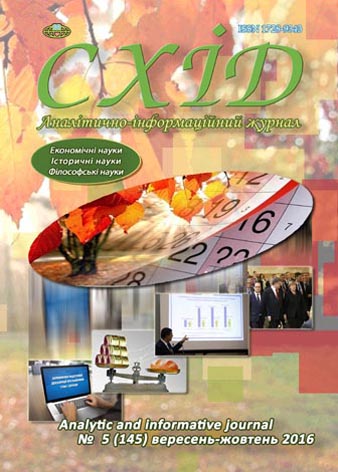Heidegger studies and the shift of philosophical historiography
DOI:
https://doi.org/10.21847/1728-9343.2016.5(145).83845Keywords:
Heidegger studies, philosophical historiography, Rezeptiongeschichte, discourse, hermeneutics, reconsttructionAbstract
The purpose of the study is to shed light on introduction of the concept of reception history to the philosophical historiography, taken within the framework of the current Heidegger studies in Ukraine and worldwide. The methodology combines elements of discourse analysis with traditional methods of historical and philosophical criticism. Scientific novelty is expressed in the following statements: 1) the problem of the recent history of reception of Heidegger's philosophy worldwide is missing in the Ukrainian historico-philosophical discourse; 2) the concept of Rezeptiongeschichte should be included to the framework of philosophical historiography as essential method of bridging the gap between the Ukrainian philosophy and the global intellectual trends; 3) transition of the philosophical hermeneutics from interpretation to reception deconstructs Hegelian notion of history of philosophy as philosophy into a much more pragmatic notion of history of philosophy as a filiation of intellectual history. Conclusions. The Ukrainian discourse of philosophical historiography still resists the urgency of the postmodern situation, finding an escape in idealistic metaphysics of history, which conceives the Heideggerian idea of sublime philosophizing as opposed to the mundane practices of calculating mind of science. This naїve Heideggerianism interferes with adequate development of Heidegger studies in Ukraine. However, it can be surpassed by shifting research focus from purist hermeneutics of texts and ideas to reconstruction of various receptions of Heidegger's thought worldwide. Such a shift can be backed by re-interpretation of philosophical historiography in terms of sociology of knowledge or intellectual history rather than hermeneutics and phenomenology.
Downloads
References
Baumeister, A. (2012), Origins and Hidden Motives of Fundamental Ontology, Sententiae, Vol. XXVІІ, pp. 46-59 (ukr).
Bohachov, A. (2011), Experience and Sense, Dukh i Litera, Kyiv, 336 p. (ukr).
Gorskiy, V. (1981), Historico-philosophical interpretation of text, Naukova Dumka, Kyiv, 208 p. (rus).
Dakhnii, A. (2012), Destruction as method of hermeneutical phenomenology of Martin Heidegger, Herald of Lviv University: Philosophy Series, pp. 29-37 (ukr).
Kebuladze, V. (2013), Phenomenology and Hermeneutics in Contemporary Ukrainian Historic-Philosophical Research, Sententiae, Vol. XXIX, pp. 46-59 (ukr).
Pettigrew, D., ed. (2008), French interpretations of Heidegger: an exceptional reception, State University of New York Press, New York, 300 p.
MacAvoy, L. (2013), Heidegger’s Anglo-American Reception. In: The Bloomsbury Companion to Heidegger, Bloomsbury, London, pp. 425-432. doi: 10.5040/9781472548313.ch-053
Sheehan, Th. (2016), The Reception of Heidegger’s Phenomenology in theUnited States. Unpublished manuscript, available at: https://www.academia.edu/26545151/The_Reception _of_Heideggers_Phenomenology_in_the_United_States.
Woessner, M. (2011), Heideggerr in America, Сambridge University Press, New York, 308 p. doi: 10.1017/CBO9780511777998
Downloads
Published
How to Cite
Issue
Section
License
Copyright (c) 2016 Andrii Karpenko

This work is licensed under a Creative Commons Attribution-NonCommercial-NoDerivatives 4.0 International License.
1. Authors bear responsibility for the accuracy of facts, quotations, numbers and names used.
2. Manuscripts are not sent back.
3. The publisher does not always agree with the authors' opinion.
4. The authors reserve the right to authorship of the work and pass the first publication right of this work to the journal under the terms of a Creative Commons Attribution-NonCommercial-NoDerivatives 4.0 International License. This license allows others to distribute (copy) the published work for non-commercial purposes, provided there is mandatory attribution to its authors and a link to the first publication in our journal.
5. The authors have the right to conclude separate supplement agreements that relate to non-exclusive work distribution in the form in which it has been published by the journal (for example, to upload the work to the online storage of the journal or publish it as part of a monograph), provided that the reference to the first publication of the work in this journal is included.

